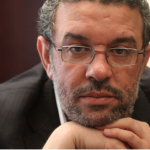As Egyptians commemorated the second anniversary of the January 25 Revolution on Friday, violence erupted as protestors and security forces clashed. And on Saturday, more violence erupted after 21 defendants were sentenced to death in the Port Said football massacre case. Since then, newspaper columns have been filled with reports of the latest death toll, with 30 people dead and 300 injured thus far throughout the country. Many writers have criticised Morsy’s response to the crisis and believe that Egyptians are close to ousting his regime, just as they did with that of his predecessor.
Amr Al-Shobaki
Don’t imitate Mubarak
Al-Masry Al-Youm newspaper
The Muslim Brotherhood are wrong to believe that they can solve the current crisis simply through a cabinet reshuffle or by appointing new governors, writes Amr Al-Shobaki. The political situation in Egypt has escalated and the majority of Egyptians have lost trust in Morsy’s administration, with some even doubting his legitimacy.
Comparing the current crisis with the Mubarak era, Al-Shobaki recalls Gamal Mubarak and his group of politician friends; certainly qualified to play politics, but ultimately rejected by Egyptians due to their distaste for the concept of a Mubarak political dynasty, with Gamal taking over after his father. Hosni Mubarak’s aides did not intend to effect any substantive reforms but only sought to gain and hold on to power. The main predicament, therefore, says Al-Shobaki, lies in the fragile, impoverished nature of their political program, mission and vision.
Al-Shobaki condemns the Muslim Brotherhood for manipulating the law, protesting around the constitutional court and sacking the former minister of interior, after prominent Salafi preacher Hazem Abu Ismail called for his dismissal. Throughout the past eight months, the once-banned group has failed to convince Egyptians that its utmost concern is the establishment of a state of law.
The Brotherhood wasn’t able to differentiate between running a religious organisation and a large republic. Until this moment, they have been unable to learn from their mistakes, or look ahead towards reforms, or to convince Egyptians that they will be able to control the situation.
Mohamed Salmawi
January 2011 and 2013
Al-Masry Al-Youm newspaper
Salmawi compares Tahrir Square of 2011 to that of 2013. He writes that the same demonstrators who were present in the square in 2011 were also there last Friday. Elderly men, women, children and youth filled the Square to the brim, chanting slogans against the Muslim Brotherhood and Morsy. As Salmawi stood under a large banner listing the names of members of the Egyptian Union of Writers, he recalls how protesters approached him and his fellow writers, praising their work, which provided the impetus for them to start a revolution.
Word-for-word, almost exactly the same slogans heard in 2011 were being chanted this year, except for one minor detail: the name “Mubarak” has been replaced with that of “Morsy”: “Oh, Morsy! Wake up, today is your last day.” Other slogans were chanted, this time directing their rage at the Muslim Brotherhood: “No to a Brotherhood state” and “Oh useless Brotherhood! Our revolution continues”.
Tear gas was being fired at protesters but all those present were well equipped with mineral water, masks and flags, enabling them to counter the ensuing effects. The writer states that Egyptians are almost ready for a new revolution. From what he saw in Tahrir Square during the Revolution’s second anniversary, Egyptians are now targeting one thing: the ousting of President Morsy. The square was thus filled with the familiar chant once again: “The people demand the downfall of the regime.”
Killing politics
Amro Khafagy
Al-Shorouk newspaper

Khafagy believes that the only likely effective solution for the current escalating situation is conducting a proper and fruitful national dialogue. The recent incidents across Egypt, with 30 dead and 300 injured thus far, is simply the normal, expected result of a failing political system, he says. When all roads to dialogue are closed and no attempts to reach consensus exist, Khafagy sees no result but widespread violence in the streets.
After electing the first civilian president after the Revolution, many expected the emergence of a civilised, democratic state. However, the reality is that politics in Egypt has been very swiftly killed: The country’s various political groups continue to jostle and jockey each other for power, with disastrous consequences, while President Morsy has lost the trust of the Egyptian people despite managing to convince so many of them to vote for him during presidential elections.
Hopes were high, then, that the new president would not be affiliated with the “Ancien Régime”. When Morsy won, he neither fulfilled his promises nor succeeded in managing tense situations. Presidential decrees and constitutional declarations only added to the inflamed scene, where the only effective way out was genuine dialogue, says Khafagy. Egypt still has a chance to return back to normal, he says, only if consensus is reached and politics isn’t killed.
Where did the state go?
Emad Al-Din Hussein
Al-Shorouk newspaper

After the death of 30 and the injury of 300 in different governorates across Egypt, Hussein attempts to analyze the current situation. Briefly, we can say that Egypt as a state has gradually faded out. The continuous protests and anger fueling the streets and city squares across the nation reflect a deep scar in Egypt’s political stability. The writer throws the blame Morsy’s way, highlighting his unwise decisions and passive attitude. If it were not for this poor performance by the president, Egypt would not be in the state it is now.
If the Muslim Brotherhood did not consider itself the official spokesperson of all Egyptian Muslims, and the opposition saw itself as representing a mere part of society and not its entirety, the country wouldn’t have reached this stage of uncontrollable chaos, he says. But despite pointing fingers at the Brotherhood and the opposition as the main culprits responsible for this dark period, the columnist believes that the presidency itself must bear the brunt for every violent incident happening in Egypt right now.
Hussein says the institution of the presidency needs to be fully aware that the country is in the most critical situation it could ever be in. It is not important that the president and his institution have good intentions towards the country, what is important now is the implementation of their reform program or any plans to save Egypt.
Ibrahim Mansour
Martyrs are falling, Morsy and Ibrahim are responsible
Al-Tahrir newspaper

Morsy has proven that he is following in the footsteps of Mubarak during his unwise response to the January 25 Revolution’s second anniversary protests, writes Mansour. Morsy is the Muslim Brotherhood’s front for the presidency just like Mubarak was for the political committee of the National Democratic Party, led by his son Gamal.
The minister of interior, Mohamed Ibrahim, is also following suit, walking the well-trodden path laid out by his predecessor, Habib Al-Adly, Mubarak’s minister of interior. He has obeyed the orders of the Muslim Brotherhood and allowed police forces to shoot protesters and react violently to protests.
It looks like Egyptians have already ousted Morsy’s regime through their continuous protests and criticism of his administration. But it seems Morsy has not received their messages yet, says Mansour. Apparently, he is waiting to receive the orders from the Muslim Brotherhood Supreme Guidance Bureau to either leave office or just remain passive towards the demands of the protesters.
The writer criticises Morsy’s latest tweet, appearing at 1.30am on Saturday, through which he thought he was successfully addressing his nation. In Mansour’s view, Morsy couldn’t dare to show himself before the people after 30 people died and hundreds were wounded, just because a court verdict has sentenced 21 defendants to death.




